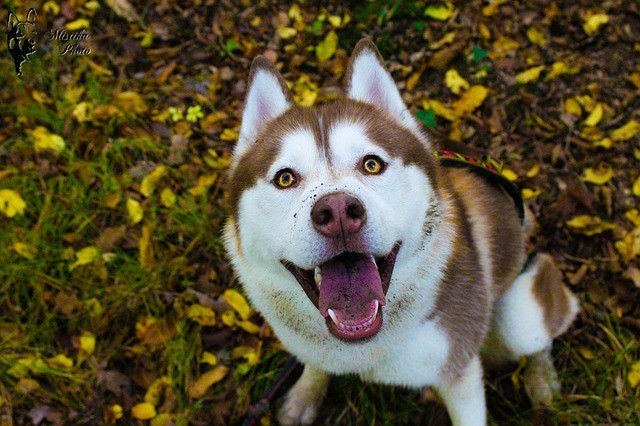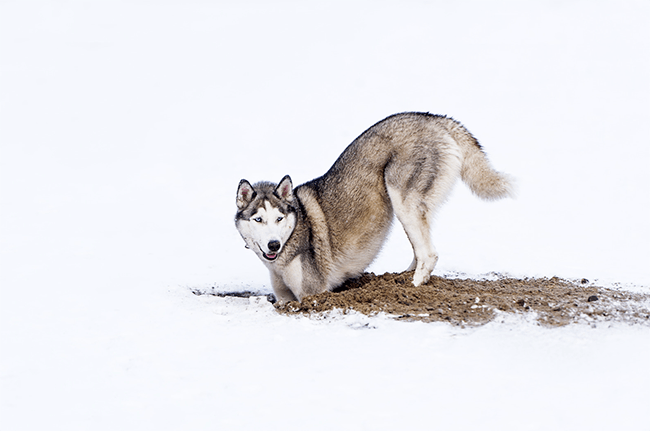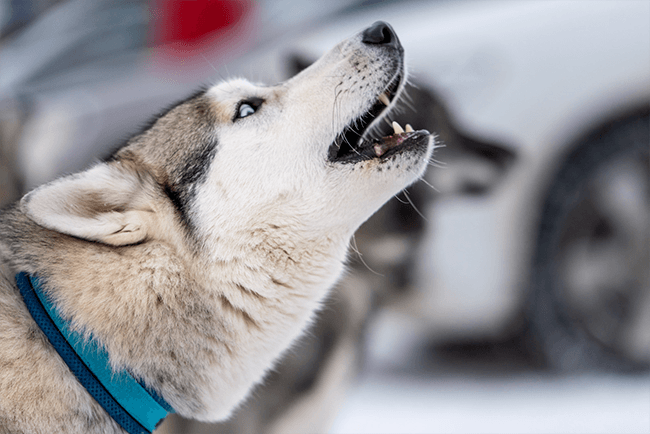With a husky’s wolflike features and vibrant eyes, they do look ominous and threatening. However, just like all dog breeds, it’s all about how you train your husky.
Are huskies aggressive dogs?
No more so than any other dog.
Huskies are very intelligent dogs and need constant mental stimulation. If you invest a lot of time and effort into your husky, the chances are he won’t be as aggressive as the myth warns.
Huskies are pack animals with a high prey drive. With a lack of training, exercise, and mental activity, a husky might become destructive.
If they are not exposed to other animals from a puppy, they might show aggression to small animals. With proper training, this can be avoided.
Huskies are generally family dogs who get along with most people, especially children. They are not bred as guard dogs and normally only get aggressive when their recourses are being threatened. Then, why do people say that huskies are aggressive?
What Are Acts Of Aggression?

What Are Acts of Aggression?
Huskies are exceptionally energetic and bright creatures.
They are often described as ‘dramatic’ and it’s easy to see why.
They will constantly look for something to do. If you don’t provide the necessary mental stimulation and exercise, they will surely find another form of entertainment such as biting your furniture or digging holes in your flower beds.
Here are some acts that might seem like mere naughty behavior, but if they are not addressed, they might become a problem in the future.
Displays of Dominance
Huskies can present displays of dominance through biting, growling, baring teeth, or unpredictable behavior.
If your Husky feel like they have the alpha role in the pack (your family), they will display assertive behavior that might make you feel unsafe. This needs to be addressed from an early age to identify the reason for the aggression. Seek the help of a behavioral specialist if need be.
Being Aggressive Toward Other Dogs
Preventing your husky from socializing with other animals from a young age might cause them to exhibit signs of aggressive behavior towards other animals when they are older. Again, huskies have a strong prey drive.
So, while they might get along with dogs their size, smaller animals might not stand a chance.
If your husky is not aware of other animals, they presume that they are the only animals in the world and will become dominant; sometimes lunging at them without any provocation.
To correct this behavior, you can practice with your husky on a lead in the vicinity of other dogs. Watch his body language and reprimand him when he becomes aggressive.
Also, praise him when he interacts with the other animal in an acceptable manner. Socialization is important and can significantly help with a dog’s temperament.
Chewing Items
Chewing is also a minor sign of aggression, but it’s part of being a canine. They massage and clean their teeth, and they chew on things when they become bored.
The proper reaction is not to scold them for chewing on something but to redirect their attention to items they are allowed to nibble on, like their toys or a nylon bone.
It might also indicate that they are not getting enough exercise or activities to train their minds.
Jumping On People
It might be a joyful sight to see when your husky greets you at the door and jumps up to meet you, but be careful allowing this behavior to continue. Your husky may repeat the behavior when visitors come over. If he sees that you disapprove, he will become confused and not understand what he has done wrong.
Therefore, it’s better to maintain a general rule that he doesn’t jump up on people.
Digging Holes

Your husky is by nature a resource-guarding animal and will always forage for food and shelter.
Just like many people, a husky needs to keep his paws busy. Since you already provide his food and shelter, digging is a way of expelling an excess of his energy.
If you find your husky in the backyard digging a few holes, it is best not to speak to him angrily but divert his attention to a section in the garden they are allowed to explore.
If they do, praise them so they can learn where they can dig.
Barking and Growling
Numerous canine breeds have a propensity to barking, and huskies are one of the more vocal species.
In time you will learn your husky’s types of barks, whether it’s a playful bark or a commanding bark. If he barks once or twice at intruders or when the doorbell rings, that is a beneficial bark you don’t want him to lose.
Should someone break in at night, you will want him to alarm you of their presence.
If your husky barks excessively, it might be better to address this from an early age. Instead of reprimanding him when he barks, teach him a command that will silence him when he barks too much. This training method is reinforced with lots of praise and treats.
Growling is another sign of aggression in dogs and may be a warning that they might bite. Growling may also be an expression of power as your husky tries to establish its position as the alpha over another animal. Growling may also be an indication that they have seen something that triggered their natural hunting instinct.
See also: The best anti-bark training devices.
Begging and Stealing Food
If your husky tends to steal food off your table or begs for snacks while you’re eating, first investigate why he is demonstrating this behavior. Is it because he’s hungry, or maybe you need to reevaluate his dietary needs?
Giving your animal food from your plate is highly discouraged in any circumstances. In time, he will get used to you not giving him snacks while you eat and eventually stop begging.
Food Aggression
Food aggression is considered a territorial reaction your husky may experience when eating their meals or treats. It is a hostile behavior they exhibit as they guard their food.
This kind of food aggression is actually quite common in dogs; however, this kind of behavior can become an issue when the dog lives at home with other animals and small children.
The husky’s instinct is to compete for resources early on. They are driven by nature and can become especially protective if they feel that they are left with limited resources. You may even notice this behavior in your husky puppy.
You might notice that they growl as they bury their muzzle in their food bowl and as they try to devour their meal as quickly as possible.
To stop food aggression, get your dog used to your presence while they are eating. You can stand close to them and talk to them as they eat, try hand feeding them, and touch their bowl without taking food out of it.
Your husky will see you are not trying to steal their food from them, which may help with the aggressive behavior.
Separation Anxiety
No pet likes to see its owner leave the house, which is even more true for a husky.
Getting your husky used to not being around you every hour of every day will be difficult since huskies do not like to be left alone.
Crate training is a very handy tool that you can implement during times when you are at home. Try not to make such an ordeal of saying goodbye and saying hello when you arrive back home. They get accustomed to it being a big affair to greet you, and they will crave the attention when you’re gone.
Another trick is to give your husky a treat when you leave so he will associate it with a good experience.
Signs Of Aggression In Your Husky

The husky is a loyal dog breed that is highly intelligent but has a stubborn streak which makes them challenging to train. Signs you should look out for in your husky’s behavior are things like the following.
- Your husky is overprotective, jealous, or guarding against other humans or animals
- He is not obedient towards other members of your family
- He has trouble listening to commands from his owners
- The husky has no boundaries and constantly jumps, steps, pushes, or leans hard against you to control your movements
- They steal food off your plate, the table, from your hand, or other surfaces
- Tries to be commanding by excessive growling, snarling, snapping, and biting
- He will mark his territory inside and outside the house
- Dominate humans and other dogs by mounting them
How to Train Your Husky to Be Protective
To train your husky, make sure you have a short leash, a body harness, and plenty of treats. The main thing to remember is patience and lots of time with your husky.
They are hardworking dogs and love to learn, but you need to be willing to put in the time and effort. Here is a short recipe to get the best out of your dog.
- Start as early as possible. You can even start as early as a few weeks old
- As soon as a stranger is in the vicinity, draw your husky’s attention to the new individual. Whisper or point until he realizes and starts sniffing
- Once he barks or pays attention to the stranger, reward him with a treat and lots of praise. You can even use a clicker to signal that he has done well
- Test him often during your daily walks. Later you can incorporate someone you know to scream and run away as soon as he starts barking. Then reward your husky when that happens so he will recognize that as the desired response
- It’s better to avoid punishment as this will only confuse him. Rather use continual positive reinforcement
Positive Reinforcement Training
During positive reinforcement training, you are rewarding your husky for behaviors you want to see. Immediately praise and reward the husky’s desired behavior using treats and affection.
You also want to keep your positive reinforcement training short and fun for your husky. The overall goal is to get your husky to realize that he is rewarded with good things when he obeys his dog owner.
Avoid making things overly complicated and always show consistency while training. Without consistent training, you will confuse your pup and won’t know how to act appropriately.
Obedience Training
With obedience training, your husky can be taught good behavior to replace bad behavior like aggression, leash pulling, barking, and more. Training should not be about compliance through force or punishment.
Obedience training should change the cycle of aggressive or bad behavior by allowing the dog owner to identify triggers and then break down short-term and long-term strategies to help deal with the bad behavior.
How to Avoid Aggressiveness In Your Husky
Huskies have an abundance of energy that requires exercise and fun activities to keep them from getting bored. To avoid aggression in your husky, keep the following in mind:
- They need daily exercise and training to keep them occupied
- Arrange playdates with other friendly dogs and people
- Make sure you provide your husky with enough toys and chew items
- Teach your puppy not to bite you or other things when he gets excited
- Don’t allow anyone to trap or threaten your husky, and never let people take away valuable items like his food
Final Thoughts on Aggression in Huskies
Huskies are not a dangerous or aggressive dog breed. They are not meant to be a guard dog or bred to defend your property. Rather, they are a fiercely loyal, intelligent, and affectionate dog breed.
If your dog is displaying aggressive tendencies, it doesn’t mean they are a bad dog. It simply means they may need proper training to address the bad behavior and encourage good behavior.
Huskies are friendly and sociable dogs that enjoy training and learning new things. You should be prepared as a husky owner to put in copious amounts of effort and time teaching your husky the correct behavior.
If you do, you will have no reason to fear your husky.
